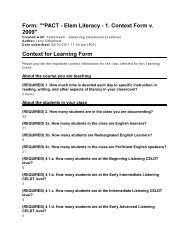The Tutoring Book - California State University, Sacramento
The Tutoring Book - California State University, Sacramento
The Tutoring Book - California State University, Sacramento
You also want an ePaper? Increase the reach of your titles
YUMPU automatically turns print PDFs into web optimized ePapers that Google loves.
113<br />
Niccole Scrogins<br />
Fall 2008<br />
African American Vernacular English and the Larger-Than-Academics Problem: Social, Economic, and<br />
Educational Immobility and the Loss of Identity<br />
<strong>The</strong>re seems to be a growing awareness of the potential importance of our ever-changing textual<br />
world and its effects on young writers, especially speakers of African American Vernacular English (AAVE)<br />
whose nonstandard interaction with Standard American English (SAE) writing continues to obstruct their<br />
academic and economic success. Many of these students are not only disadvantaged socially and economically,<br />
but they also struggle educationally. Many of the obstacles they encounter are similar to those of multilingual<br />
students who struggle with cultural and linguistic interference when learning SAE for academic purposes, all the<br />
while trying to maintain their personal identities through their organic languages and cultures.<br />
While SAE is institutionally preferred or standardized in academic writing, there may be a need to<br />
accept a certain amount of AAVE writing characteristics in order to help AAVE speaking students transition into<br />
SAE writing. It should not be our goal as tutors to extinguish the use of AAVE all together. Instead, we should<br />
attempt to help these students become aware of the differences and give them the tools to use both appropriately<br />
in any given context. Perhaps the adroit ability to move between these varied discourses can then be marveled<br />
similar to that of a multilingual individual’s ability to code switch. If you have ever heard a bilingual speaker, say<br />
of Spanish and English, utter a sentence that is made up of vocabulary from both languages, then you have<br />
witnessed the phenomenon of code switching. This often happens to individuals who speak more than one<br />
language and who are no longer translating vocabulary from their native language to the second language in order<br />
to speak. Essentially, code switching occurs when a multilingual speaker thinks in more than one language at a<br />
time. This is an important skill to teach AAVE speaking students if we want to see them succeed in the academy.<br />
More crucially, speakers of AAVE who do not acquire standardized writing practices are left little room for<br />
socioeconomic advancement. <strong>The</strong>se socioeconomic and vertical mobility disadvantages haunt many speakers of<br />
AAVE culturally, academically, and vocationally. However, as a word of caution to avoid racially stereotyping<br />
African Americans, it is imperative to remember that not all African Americans are speakers of AAVE, some<br />
speakers of AAVE are of other ethnicities, and being a speaker of AAVE is not necessarily an indication of an<br />
AAVE writer.<br />
Stratification can be particularly immobilizing for the successful career advancement of speakers<br />
of AAVE with a less than stellar socioeconomic status. AAVE prevents many capable job candidates from either<br />
getting a job for which they are qualified or being promoted to do jobs they may have otherwise earned if their<br />
use of AAVE was not stigmatized. <strong>The</strong> stratification of SAE above other varied dialects of English has created a<br />
social stratification of speakers of those dialects, especially AAVE, which affects individuals’ lives in many<br />
contexts, including their careers. Walker asserts, “A possibility must be stressed that, with becoming standard,<br />
there is one less barrier to entrance into the mainstream of society. For example, a job interviewer will not be able<br />
to use English as an excuse for not considering a black person for a job” (1977, p. 42). Donlan also recognizes the<br />
effect social stratification has on successful mobility and argues “that America’s schools must provide the<br />
instruction necessary to free the growing number of disadvantaged from a hapless future of continued poverty and<br />
frustration” (1974, p. 261). But I think Joan Baratz’s succinct words, as quoted in Fasold & Shuy, resonate the<br />
genuine issue: “In refusing to teach standard English to these [students] we cut off even further their possibility of<br />
entering the mainstream of American life” (1970, p.26). Although this is much more general and in response to<br />
the issue of neglecting to address AAVE features and teach SAE, the issue is not who should be responsible for<br />
the acquisition of SAE, but merely that it is fundamental for the mobile, social, and cultural success of a large<br />
demographic of society. Essentially, there is much more at stake for these students than grades or passing a class.<br />
When tutoring speakers of AAVE, it is necessary to maintain a keen sensitivity to what more these students have<br />
to lose.

















